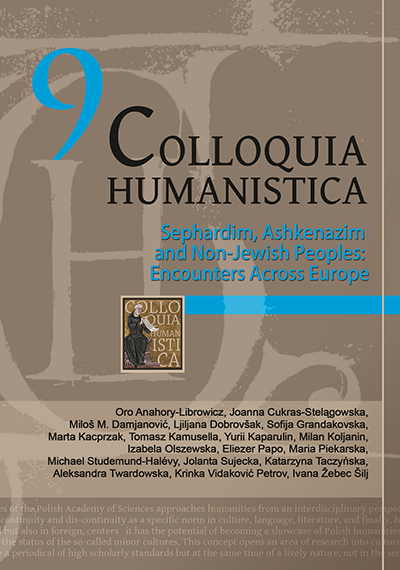Społeczność żydowska i antysemityzm w Królestwie Serbów, Chorwatów i Słoweńców/Jugosławii 1918-1941
The Jewish Community and Antisemitism in the Kingdom of Serbs, Croats and Slovenes/Yugoslavia 1918-1941
Author(s): Milan KoljaninSubject(s): Jewish studies, History of Antisemitism
Published by: Instytut Slawistyki Polskiej Akademii Nauk
Keywords: Yugoslavia; Jews; identity; loyalty; antisemitism; tradition; National Socialism; World War II
Summary/Abstract: The Jews in the Kingdom of Serbs, Croats and Slovenes/Yugoslavia made up about 0.5 percent of the total population. The new national framework provided the ability to accept the new state and national idea, but also gave impetus to strengthening their own identity embodied in Jewish nationalism, Zionism. Jews adapted to the new political circumstances relatively quickly and without major turmoil, at least as a whole. A liberal political foundation enabled the Jews to identify relatively easily with the new state. However, over a shorter or longer period, there were earlier national identifications as well. The spread and acceptance of antisemitism in Yugoslavia was affected by different traditions of the attitude towards the Jews in the political culture, political relations in the country and international circumstances. These factors were cumulative, although international circumstances certainly had a crucial impact, especially the coming to power of National Socialists in Germany. The manifestation of antisemitism in Yugoslavia can be divided into three main periods: 1918-1933, from the establishment of the Yugoslav state to the intensification of antisemitic propaganda, 1934-1938, from the intensification of antisemitic propaganda to the start of Jews’ conditioned loyalty, and 1939-1941, from the start of Jews’ conditioned loyalty to the Axis powers’ invasion of Yugoslavia in April 1941. Hostility towards Jews was manifested much more strongly in the Habsburg Monarchy than in the Kingdom of Serbia. Therefore, the new state in the former monarchy territories inherited latent and sometimes open antisemitism. The spread of antisemitic propaganda and legislation in Yugoslavia should be associated with the state leaders’ attempts to find a modus vivendi with the totalitarian revisionist neighbors, primarily Germany. As a result, in early October 1940 the government adopted two anti-Jewish decrees. The destruction of the Yugoslav state in April 1941 heralded the beginning of the Holocaust there.
Journal: Colloquia Humanistica
- Issue Year: 2020
- Issue No: 9
- Page Range: 139-152
- Page Count: 14
- Language: English

